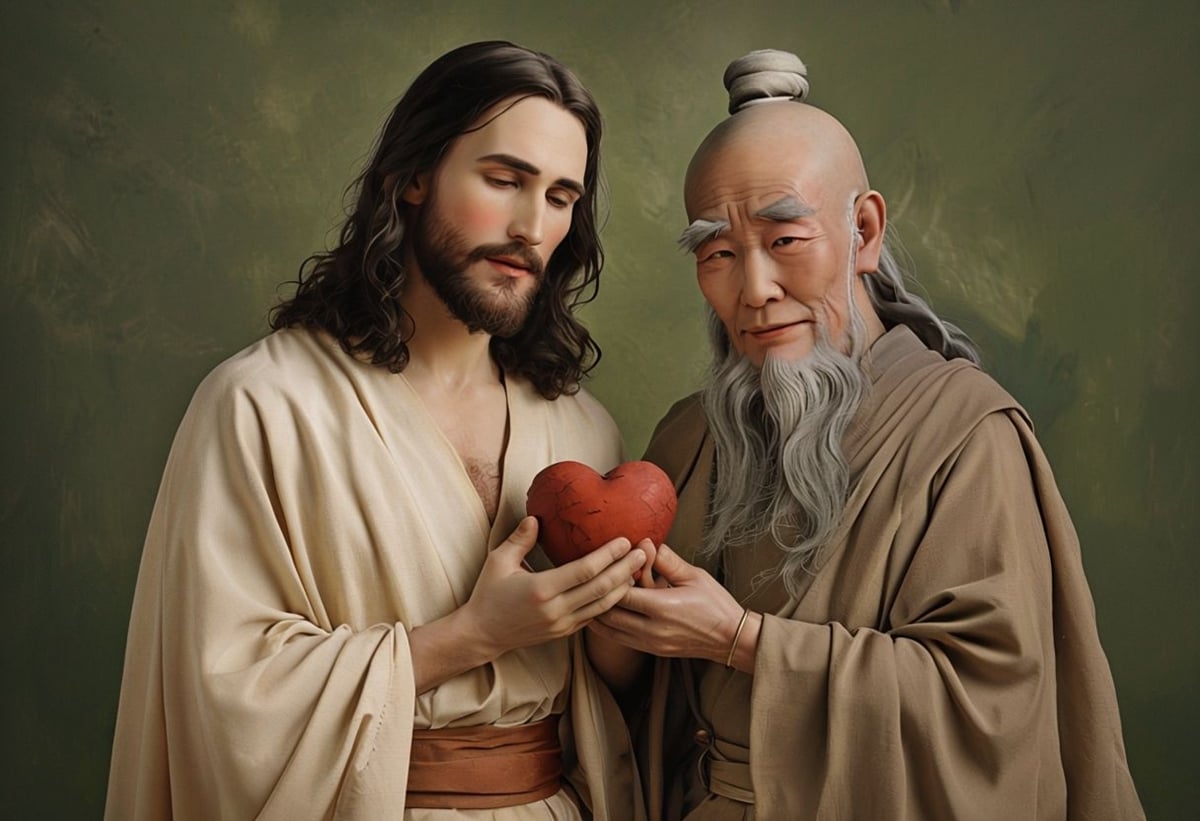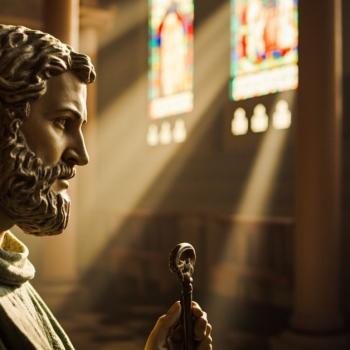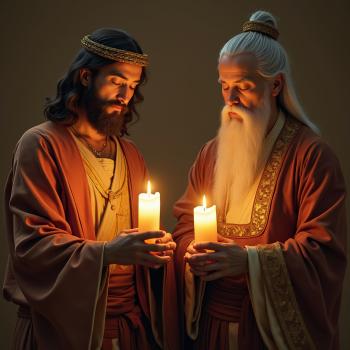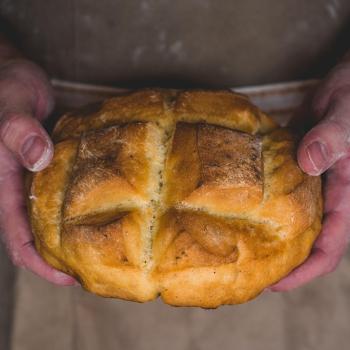Christians believe in Christ. Taoists follow the Tao. But Jesus and Lao Tzu demonstrate how to embody the Way of Love completely.

There is a tremendous difference between having faith in a belief system and walking in its path. Faith isn’t about ascribing to dogma. Instead, it’s about trusting God and putting flesh to the Tao of Love.
Lao Tzu’s Tao Te Ching, Verse 23
Stephen Mitchell Translation
Express yourself completely,
then keep quiet.
Be like the forces of nature:
when it blows, there is only wind;
when it rains, there is only rain;
when the clouds pass, the sun shines through.
If you open yourself to the Tao,
you are at one with the Tao
and you can embody it completely.
If you open yourself to insight,
you are at one with insight
and you can use it completely.
If you open yourself to loss,
you are at one with loss
and you can accept it completely.
Open yourself to the Tao,
then trust your natural responses;
and everything will fall into place.
Limiting Your Speech
The first stanza of this verse talks about the virtue of limiting your speech. The Stephen Mitchell translation says, “Express yourself completely, then keep quiet. Be like the forces of nature: when it blows, there is only wind; when it rains, there is only rain; when the clouds pass, the sun shines through.”
Similarly, Victor H. Mair translates these lines as follows: “To be sparing of speech is natural. A whirlwind does not last the whole morning, A downpour does not last the whole day. Who causes them? If even heaven and earth cannot cause them to persist, how much less can human beings?” However these words are translated, they emphasize the importance of holding your tongue.
The book of Ecclesiastes says there is a time to speak and a time to keep silent. Knowing which time it is, the sage says only as much as she must but then desists. “…The Lord is in his holy temple,” says the prophet Habakkuk. “Let all the earth keep silence before him.” There is a time to let your speech flow freely, even at times with the ferocity of a whirlwind. But the world finds the Tao when it keeps silence.
If You Open Yourself
The mental and emotional storms that drive our speech will come and go. Each has its purpose and season. In the same way, our words must know when to end. Steven Mitchell’s translation continues: “If you open yourself to the Tao, you are at one with the Tao and you can embody it completely. If you open yourself to insight, you are at one with insight and you can use it completely. If you open yourself to loss, you are at one with loss and you can accept it completely.” If you want your speech to be true, then you’ve got to be open to the Way of Love.
Content in All Things
The apostle Paul embodies this when he says he is content in all things. He knows what it means to prosper and to be in need and could be content in both. He engages scholars in lofty conversations, while also embracing the foolishness of the weak. He functions among Jews as a Jew, and among Gentiles as a Gentile, unbound by the expectations of either. By following Christ, he can be all things to all people.
Paul says he has no need to worry about his provision. He can live this way because he follows the principles of the Tao. Lao Tzu writes, “Open yourself to the Tao, then trust your natural responses; and everything will fall into place.” If you trust the ever-present help of Christ, then you can be content in all circumstances. Whether you have much or whether you have a little, you can flow with the situation.
Trust and Belief
Trust is different from belief. Trust is not a matter of theological propositions that you choose to agree with. That is Belief. I can intellectually believe all day long that a chair will hold me. But, until I put my weight in it, I have not truly trusted. Trust in Christ means allowing heaven to guide you. It isn’t about doctrinal correctness. Instead, it is flowing with the Tao of all things.
The book of Proverbs says, “Trust in the Lord with all your heart, and do not rely on your own insight. In all your ways acknowledge him, and he will make straight your paths.” When you trust in the Tao, you no longer have to try to understand it. All you must do is follow, and everything falls into place.
Practice…
In Living Buddha, Living Christ, Thích Nhất Hạnh writes:
“When the Buddha was asked, “Sir, what do you and your monks practice?” he replied, “We sit, we walk, and we eat.” The questioner continued, “But sir, everyone sits, walks, and eats,” and the Buddha told him, “When we sit, we know we are sitting. When we walk, we know we are walking. When we eat, we know we are eating.”
This same principle applies in Taoism and Christianity. Ecclesiastes says, “Whatever your hand finds to do, do with your might.” Putting this teaching into practice means that whatever you do, you should do with your full presence. And, whatever you feel, you should feel with your full presence as well. This means that when you are happy, you should allow yourself complete joy. When you are grieving, instead of bottling up your feelings, you should permit yourself complete access to those feelings of sorrow. And when you love, you should do so in complete ecstasy and abandon.
To flow in the Tao of Love, you must be able to embody the full range of emotions. Be like the storm, and rage. Be like the lake and sit at peace. But then leave it alone. Just as you don’t want to linger too long in that rage, neither should you make too much a habit of bliss. Walk without expectations but be prepared to follow in the direction that the Spirit leads.
When you learn to trust the Holy Spirit, you can be content in all things. You don’t need to force situations. You don’t need to coerce yourself to feel or do this thing or that. Following the Tao of Love is more than belief in theological or spiritual principles. It is learning to “trust and obey, for there’s no other way.”
For related reading, check out my other articles:
- Jesus & Lao Tzu Return to the Source
- Jesus & Lao Tzu: Lead Like Yoda
- Jesus and Lao Tzu Talk About Eternal Life


















